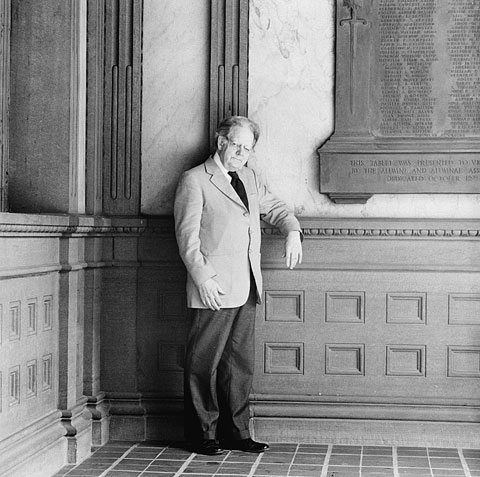Northrop Frye Frasi e Citazioni
Northrop Frye: Frasi in inglese
"Quotes", The Educated Imagination (1963), Talk 6: The Vocation of Eloquence
"Quotes", Anatomy of Criticism: Four Essays (1957), Polemical Introduction
“The world of literature is human in shape”
"Quotes", The Educated Imagination (1963), Talk 1: The Motive For Metaphor http://northropfrye-theeducatedimagination.blogspot.ca/2009/08/1-motive-for-metaphor.html
Contesto: The simple point is that literature belongs to the world man constructs, not to the world he sees; to his home, not his environment. Literature's world is a concrete human world of immediate experience... The world of literature is human in shape, a world where the sun rises in the east and sets in the west over the edge of a flat earth in three dimensions, where the primary realities are not atoms or electrons but bodies, and the primary forces not energy or gravitation but love and death and passion and joy.
“A literary critic of experience never defines anything.”
Origine: "Quotes", Interviews with Northrop Frye (2008), p. 4
Origine: "Quotes", The Great Code: The Bible and Literature (1982), Chapter One, p. 7
"Quotes", The Educated Imagination (1963), Talk 3: Giants in Time
"Quotes", Anatomy of Criticism: Four Essays (1957), Polemical Introduction
1:160
"Quotes", Late Notebooks, 1982–1990: Architecture of the Spiritual World (2002)
"Quotes", Anatomy of Criticism: Four Essays (1957), Polemical Introduction
Origine: "Quotes", Interviews with Northrop Frye (2008), p. 746
Origine: "Quotes", The Great Code: The Bible and Literature (1982), Chapter Three, p. 58
Introduction, p. xviii
"Quotes", The Great Code: The Bible and Literature (1982)
Origine: "Quotes", Notebooks and Lectures on the Bible and Other Religious Texts (2003), p. 7
"Quotes", Anatomy of Criticism: Four Essays (1957), Anagogic Phase: Symbol as Monad
Origine: "Quotes", The "Third Book" Notebooks of Northrop Frye, 1964–1972 (2002), p. 14
Origine: "Quotes", The Great Code: The Bible and Literature (1982), Chapter Four, p. 79
"Quotes", The Educated Imagination (1963), Talk 3: Giants in Time
"Quotes", The Educated Imagination (1963), Talk 1: The Motive For Metaphor http://northropfrye-theeducatedimagination.blogspot.ca/2009/08/1-motive-for-metaphor.html
“The apocalypse is the way the world looks after the ego has disappeared.”
Origine: "Quotes", The Great Code: The Bible and Literature (1982), Chapter Five, p. 158
1:154
"Quotes", Late Notebooks, 1982–1990: Architecture of the Spiritual World (2002)
"Quotes", Anatomy of Criticism: Four Essays (1957), Anagogic Phase: Symbol as Monad
Origine: "Quotes", The Great Code: The Bible and Literature (1982), Chapter 8, p. 230
“Design as a Principle in the Arts”, The Critical Path and Other Writings on Critical Theory, 1963–1975, p. 232
"Quotes"
"Quotes", Anatomy of Criticism: Four Essays (1957), Mythical Phase: Symbol as Archetype
Origine: "Quotes", The Great Code: The Bible and Literature (1982), Chapter Five, p. 106
"The Secular Scripture" and Other Writings on Critical Theory, 1976–1991, p. 164
"Quotes"
